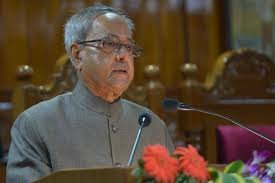New Delhi, Feb 5: Ruing that despite advancements Indian agriculture is yet to be completely out of the “clutches of weather”, President Pranab Mukherjee Friday expressed “grave concern” over likely decline in farm output for the second-straight year due to deficient rains.
With majority of the cultivatable area under severe climatic conditions like drought, floods and cyclones, he called for serious efforts to overcome the challenge and make Indian agriculture sector resilient to weather fluctuations.
President asked the Indian Agriculture Research Institute (IARI) to develop climate resilient technological solutions by leveraging opportunities from frontier science like biotechnology and nano-technology. Mukherjee also spoke about import dependence on pulses and edible oils.
Addressing the 54th convocation of IARI, he said: “Despite the advancements made, Indian agriculture is yet to be completely get out of the clutches of weather.” President also pointed out that the country’s foodgrain production fell to 253 million tonnes in 2014-15 crop year (July-June) from a record 265 million tonnes in 2013-14 on account of 12 per cent deficit in rainfall.
“Nature has not been kind to us this year as well. A deficient monsoon followed by a further dry spell is likely to affect agricultural production for the second year in a row. This is an area of grave concern.
“The time is ripe for some serious efforts as 80 per cent of the area under cultivation in India is in the grip of severe climatic conditions like drought, floods and cyclones,” he said.
Stating that global climate change could aggravate these problems, Mukherjee said the IARI must leverage opportunities from frontier sciences such as biotechnology, synthetic biology, nano-technology, computational biology, sensor technology and geo-spatial technology to develop climate- resilient technological solutions.
“Innovation in agricultural techniques and practices must be supported through infusion of funds, mentoring of ideas,and technical assistance. The risk-taking ability of farmers must be boosted. The newly-launched crop insurance scheme will leverage technology to provide risk cover to the farmers,” he said.



























